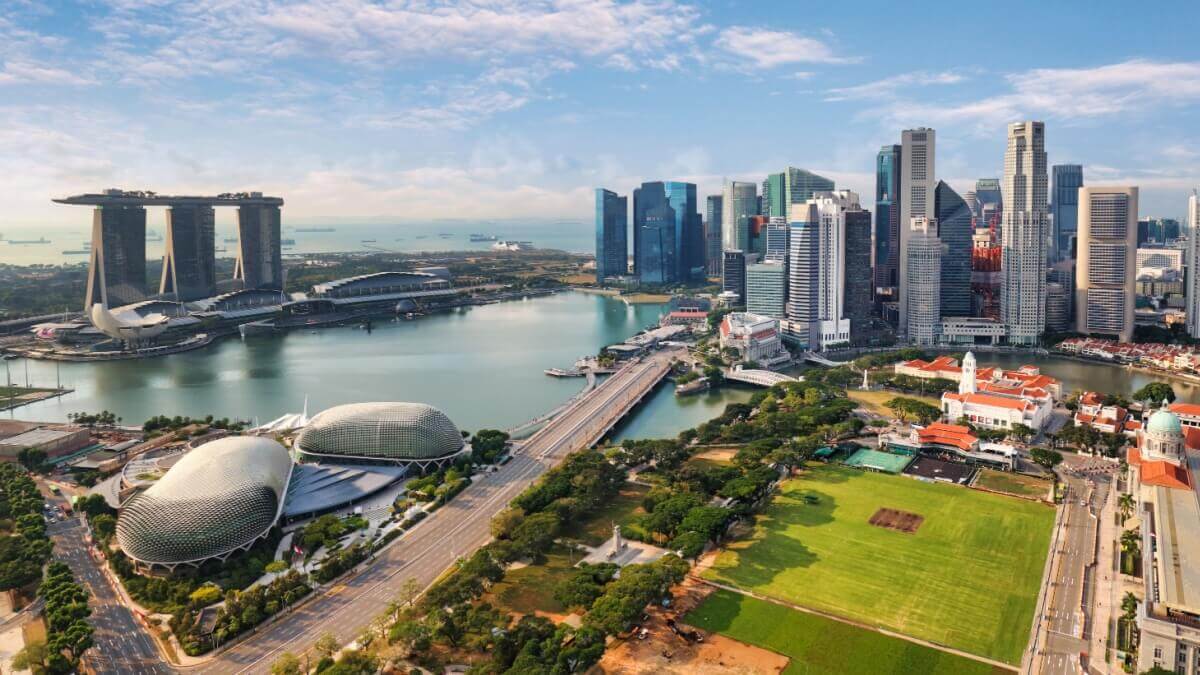Top 7 real estate agencies in Singapore
Discover the Top 7 real estate agencies in Singapore with our detailed guide. Navigate the real estate market with expert insights and reviews.

Singapore is a busy city-state that attracts expats from around the world, thanks to its high living standards and multicultural environment.
Finding and securing a rental property is typically easy - especially since real estate agents are used to working with foreigners - but you can expect to pay a lot of money for your apartment or house.
This guide will walk you through everything you need to know about renting in Singapore so you can find your dream property. We’ll also introduce Wise, a fast, simple and secure way to send money to Singapore with low fees and no exchange rate markups.
Foreigners - including Americans - can rent in Singapore without any issues as long as they have the right visa. This includes visas for workers, investors, students or any other visa that allows you to legally live in Singapore.
Most landlords in Singapore prefer long-term tenants. If you're planning a shorter stay, you might want to consider Airbnb or similar short-term accommodations instead.
You can expect to pay premium prices for rent in Singapore, similar to what you'd find in major hubs like New York or London. The city has a high cost of living, but you get a developed infrastructure and lots of fun things to do.
Here's the average rent in Singapore in USD.
| Rental property | Average monthly rent¹ |
|---|---|
| 1 bedroom apartment (city center) | 2,697 USD |
| 1 bedroom apartment (outside center) | 1,974 USD |
| 3 bedroom apartment (city center) | 5,454 USD |
| 3 bedroom apartment (outside center) | 3,745 USD |
| 🔍 Wondering how much that would cost in Singapore dollar (SGD)? Check out this handy conversion calculator: |
|---|
Your rent will largely depend on the neighborhood you choose.
For example, Ardmore Park has some of Singapore's most luxurious properties and commands top dollar. But areas like the West Coast, while further from downtown, have more affordable options and are popular with families.
Unlike many major cities, Singapore is very safe and has an extremely low crime rate, so there are no "bad" neighborhoods to avoid.
In addition to rent, you'll typically have to pay for your own utilities and internet connection. Most landlords also ask for a good faith and security deposit. Here's what to expect.
| Expense | Typical cost |
|---|---|
| Good faith deposit | 1 month’s rent² |
| Security deposit | 1-2 months’ rent² |
| Utilities | 155 USD¹ |
| Internet | 35 USD¹ |
The security deposit covers any potential damage to the property during your stay. The good faith deposit is essentially a booking deposit that later becomes part of your security deposit or first month's rent once you sign the lease.
Depending on how much you pay for rent and your lease term, you'll also have to pay stamp duty. Here are the current stamp duty rates.
| Monthly rent | Lease period | Stamp duty rate² |
|---|---|---|
| Less than 746 USD | Any period | Doesn’t apply |
| More than 746 USD | 4 years or less | Monthly rental x Length of Stay x 0.4% |
| More than 746 USD | More than 4 years | (4 x Average Annual Rental) x 0.4% |
| 💡 To make managing these payments easier, think about opening a bank account in Singapore. |
|---|
Renting in Singapore is generally straightforward, and there are only a few documents that you'll need to apply. They should be all valid for at least 6 months from your application date.²
- Employment pass or S pass
- Work permit (if applicable)
- Dependent pass (for family members)
- Valid passport
- Proof of funds for the security deposit, stamp duty and good faith deposit
Many landlords will also want to verify your income to make sure you can afford the rent and living expenses.

Wise offers you a quick, secure and transparent way of sending money to Singapore. You get the mid-market exchange rate for your payments and see how much it’s charged for the transfer before sending the money from your bank.
With the Wise Account you can also hold 40+ currencies, spend money in 150+ countries, and receive like a local in 9 different currencies.
Please see Terms of Use for your region or visit Wise Fees & Pricing for the most up to date pricing and fee information
There are 4 main types of property to rent in Singapore: public housing (HDB flats), private housing, houses and shared housing/co-living spaces. Here are the most important things to know.
Don't let the term "public housing" scare you! HDB flats are where most Singaporeans live, and they're a great - and typically more affordable - option for expats, too.
The Housing Development Board (HDB) builds these apartments, and they come in different sizes, from 1 to 3-bedroom units. There's also an executive variation that includes a larger living area and space for a study or balcony.
Just keep in mind that it's a regulated type of housing and certain restrictions apply. For example, you can only keep one dog from a list of approved breeds, and breaking this rule can result in high fines.³
Private housing typically means condominiums (condos). They're popular with expats because they often have high-end amenities like swimming pools, gyms and even tennis courts.
These properties typically cost more than HDB flats, but they come with extra lifestyle perks.
Houses aren't very popular in Singapore since it's an urban setting, but you can find some in more family-friendly areas like Holland Village.
You can rent bungalows and semi-detached homes, but they’re typically more expensive than condos. Many of them are in neighborhoods with international schools.
Shared housing is becoming more and more popular as people are trying to beat Singapore’s high living costs.
This typically means you'll rent a single room and share common areas like the kitchen, living room and bathroom with other tenants. You'll split the rent and utilities, which makes co-living a great option for young people on a budget.
There are 3 main ways to find a property to rent in Singapore. You can use online property portals, network with friends and co-workers or work with a real estate agent.
Most people start their search with online rental listings, but if it's your first time renting in Singapore, you may want to consider hiring an agent to guide you through the process.
Property portals are the go-to choice for most renters in Singapore because they give you a good sense of all of the different properties available. You can also use filters to narrow down your search by location and price.
For regular rentals, try these major platforms:
If you're looking for co-living spaces or shared housing, check out:
You can also try Facebook groups, but be cautious of scams.
If you have existing connections in Singapore, such as friends or co-workers, it's a good idea to ask them if they know of any properties available for rent.
This way, you can get access to properties before they hit the open market. Coming in recommended may help you get better rental rates or go faster through the application process, too.
The easiest way to start renting a property in Singapore is to work with a real estate agent. An experienced agent can save you time and potential headaches. They'll help you find properties and walk you through the application process.
Singapore has strict rules about dual representation. Your agent can only represent you, and your landlord will have their own agent to make sure you're both protected during negotiations.
Real estate agents charge commission fees, but if you're signing a long-term lease or renting an expensive property, you may be able to get your landlord to cover your agent's service fee.
There's typically room for negotiation - especially for high-end properties - so don't be afraid to ask.
Singapore is one of the safest places in the world and rental scams are uncommon. That said, they still do happen sometimes, so it's important to use common sense and follow basic rules that can help you avoid fraud:
- Never transfer money before viewing the property in person and meeting the actual landlord or authorized agent
- Make sure to sign a tenancy agreement - if the landlord seems hesitant or pushes for verbal agreements, this is a red flag
- Be wary of prices that seem too good to be true
- Always get receipts for any payments you make, including the good faith deposit
- Be extra careful with listings you find on social media, such as in Facebook groups
Before signing a lease, view different properties and check these key aspects:
- Distance to public transportation and places you'll often travel to, such as work or school
- Noise levels
- Neighbors
- Nearby amenities, supermarkets and restaurants
- Natural light and ventilation
- AC units (and their condition)
- Water pressure in bathrooms and kitchen
- Cell phone reception
- Signs of mold or water damage
- Age and condition of appliances
- Storage space
Don't be afraid to ask the landlord or property agent questions. You want to make sure you'll actually enjoy living in the property - especially when signing a long-term lease.
If you're looking at a co-living arrangement, make sure to meet all of your potential roommates and ask about cleaning expectations, whether you're allowed to have guests over and other important rules.
The application process will look slightly different depending on whether you're working with an agent or directly with a landlord.
Working with a real estate agent typically simplifies the process.
Step 1. Find a licensed real estate agent.
Step 2. View properties they’ll find for you.
Step 3. Once you find a property you like, gather your documents (passport, visa, proof of employment, etc.)
Step 4. Prepare a Letter of Intent (LOI) with your agent's help, including the rental rate, lease length and any special requests.
Step 5. Sign the tenancy agreement.
Step 6. Inspect the property.
Step 7. If everything looks good, get your keys and move in.
Your agent will handle most of the paperwork and may even negotiate the rent and terms on your behalf.
If you're dealing with the landlord, the application process is similar. The only difference is that you'll have to handle everything yourself.
You'll prepare your own Letter of Intent (LOI) and deal with any issues directly. English is one of Singapore's official languages, so communication should be straightforward.
Your tenancy agreement (TA) outlines your rights and responsibilities as a tenant. It does the same for your landlord. There's no fixed tenancy agreement format in Singapore, but a standard TA typically includes:
- Monthly rent and payment terms
- Lease duration
- Security deposit amount and conditions to get it back
- Stamp duties
- Maintenance and repair responsibilities
- How to pay utilities
- Furniture and appliance inventory
- Rules about guests and noise
- Pet policies
- Rules for terminating and renewing the lease
Most leases for renting an apartment in Singapore range from 1 to 2 years, but you may be able to find properties with shorter or longer terms.²
Your tenancy agreement should clearly define your rights as a tenant. Typically, you have a right to safe living conditions, peace, privacy and other basic needs.
If you have issues with your landlord that you can't resolve without involving a third party, you can get in contact with the Fair Tenancy Industry Committee.
Singapore has many popular neighborhoods, so you have choices when it comes to deciding where you want to rent. Popular spots include:
Finding an apartment in Singapore isn't hard, but you have to be prepared to spend a hefty amount on rent. In return, you get access to a safe, efficient city with excellent amenities and a high standard of living. Eventually, you may even decide to buy property in Singapore.
Use Wise to easily send money to Singapore and save on fees when making large payments such as rent. You can convert to 40+ currencies in just a tap.
Sources
Sources checked 12.2.2024
*Please see terms of use and product availability for your region or visit Wise fees and pricing for the most up to date pricing and fee information.
This publication is provided for general information purposes and does not constitute legal, tax or other professional advice from Wise Payments Limited or its subsidiaries and its affiliates, and it is not intended as a substitute for obtaining advice from a financial advisor or any other professional.
We make no representations, warranties or guarantees, whether expressed or implied, that the content in the publication is accurate, complete or up to date.

Discover the Top 7 real estate agencies in Singapore with our detailed guide. Navigate the real estate market with expert insights and reviews.

Moving to Singapore from the USA? Take a look at our handy guide and learn all about visa types, cost of living, and accommodation types there.

Boasting first-class medical facilities and expertise, Singapore regularly sees patients flying in from all over the world seeking specialist treatment....

Healthcare in Singapore may rank amongst the best in the world, but it comes at a premium price when compared to other countries in Southeast Asia. For...

One important decision, if you’re moving to Singapore with family, is how to ensure your children have the best possible education. Luckily, you're headed to...

Singapore is a fantastic expat destination, offering an exciting cultural mix, great career opportunities, and world class amenities. The standard of living...